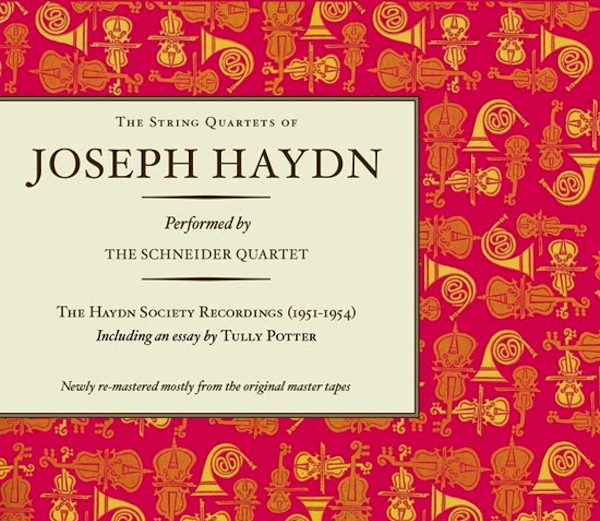Classical CD Review: The Schneider Quartet — Heavenly Haydn
Despite the monaural sound, these gloriously performed string quartets remain my favorite Haydn recordings.
The Schneider Quartet: Haydn Quartets (15 discs). Music and Arts, CD1281. $119.60.

The cover of the booklet accompanying the Music and Arts CD reissue of the legendary not-quite-complete 1951-53 Haydn Society cycle of the Haydn string quartets by the Schneider Quartet.
By Michael Ullman
Violinist Alexander Schneider was a musical wonder who enlivened the greatest chamber groups of his time. He was born Abram Sznejder, but changed his name in 1927 at the urging of the director of a small orchestra who wanted his concert master to sound more German (and less Jewish). He joined the finest quartet of the era, the Budapest String Quartet, whom the Nazis drove to the United States. He formed the Schneider Quartet in either 1949 or 1950: the group first appeared at the Casals Festival in 1950. Besides Schneider, the members included violinist Isidore Cohen (later second violinist of the Juilliard Quartet and the violinist of the Beaux Arts Trio), violist Karen Tuttle, and cellist Madeline Foley, in time replaced by Herman Busch (whose brothers included the outstanding conductor Fritz Busch and violinist Adolf Busch, the father-in-law of pianist Rudolf Serkin).
The goal of this ambitious project, sponsored by something called the Haydn Society, was to offer a complete recording of the Haydn string quartets. As I discovered from the notes for this invaluable CD set produced by Music and Arts, the Schneider Quartet never attained its goal because the Society ran out of funds. The group did record 53 complete quartets and half of another. Eventually Schneider returned to the Budapest Quartet. Much later I and a packed crowd saw him play with and conduct a chamber group at Sanders Theater in Cambridge, MA.
The original lps were released with a characteristic pictorial design: a drawing of orchestral instruments patterned like wall paper. Some came in solid red boxes. I know this because for at least a decade I vigorously searched used record stores for the Schneider Quartet Haydn recordings. I bought some discs over and over again because the copies I found were worn: obviously, previous owners had played them often. The wear-and-tear is not surprising once you hear them.
Despite the monaural sound, despite the virtuosity and beautiful tones proffered in other recordings of the string quartets, these remain my favorite Haydn recordings. The sound varies: some of the earlier recordings lack proper balance. But soon everything rights itself, the limitations of the monaural sound fades, and listener is given the gift of the most gloriously played Haydn I know. It’s the zest of the allegros, the subtlety of the dynamics and precision of the ensemble, the way they dig into certain phrases. Maybe it’s finally the rhythmic vitality of the performances that is most important, as well as Schneider’s singing tone and the way he seems to fling high, accented notes in front of him like flowers at a wedding. A Schneider Quartet recording…I am listening to Opus 77/1 right now…is like a passionately cerebral celebration. There’s dance, sober thinking, and pathos as well.
The Schneider Quartet’s version of The Seven Last Words of the Savior on the Cross, a undeniably sober subject, is filled with gravity but never drags. The uncompleted Haydn quartet is Opus 64/1: only the first and fourth movements were recorded, and they are issued for the first time in the Music and Arts box. The recordings of the complete sets, Opus 50 and Opus 76, are unparalleled. I don’t know who the Haydn Society was, but music lovers owe the group their deep gratitude for a project that was done at exactly the right time in the right way. I am also grateful for the commitment of Music and Arts, whose founder, Frederick J. Maroth, died in November of 2013. This marvelous set is dedicated to his memory.
Michael Ullman studied classical clarinet and was educated at Harvard, the University of Chicago, and the U. of Michigan, from which he received a PhD in English. The author or co-author of two books on jazz, he has written on jazz and classical music for The Atlantic Monthly, The New Republic, High Fidelity, Stereophile, The Boston Phoenix, The Boston Globe and other venues. His articles on Dickens, Joyce, Kipling, and others have appeared in academic journals. For over 20 years, he has written a bi-monthly jazz column for Fanfare Magazine, for which he also reviews classical music. At Tufts University, he teaches mostly modernist writers in the English Department and jazz and blues history in the Music Department. He plays piano badly.
Tagged: Alexander Schneider, Frederick J. Maroth, Haydn string quartets, Music and Arts
